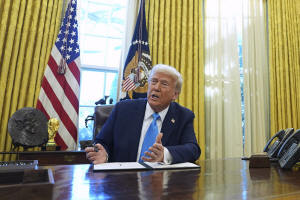A federal judge temporarily blocks parts of Trump's anti-DEI executive
orders
[March 28, 2025]
By CLAIRE SAVAGE and ALEXANDRA OLSON
CHICAGO (AP) — A federal judge has temporarily blocked the U.S.
Department of Labor from implementing parts of President Donald Trump’s
executive orders aimed at curbing diversity, equity and inclusion
efforts among federal contractors and grant recipients.
Judge Matthew Kennelly of the U.S. District Court for the Northern
District of Illinois halted the Labor Department from requiring federal
contractors or grant recipients from certifying that they don't operate
any programs in violation of Trump's anti-DEI executive orders.
That certification provision has stepped up pressure on companies and
other organizations to revisit their DEI practices because if the
government were to determine they violated the provision, they would be
subject to crippling financial penalties under the False Claims Act.
Thursday's ruling is in response to a lawsuit filed by Chicago Women in
Trades, a nonprofit founded in 1981 that helps prepare women for work in
skilled construction trades and has several contracts with the
Department of Labor. There was no immediate reaction from Chicago Women
in Trades to Kennelly's order. The Department of Justice did not
immediately respond to requests for comment.
A hearing on Chicago Women in Trades' bid for a longer-lasting halt on
Trump's anti-DEI executive orders is scheduled for April 10.

The organization's lawsuit is one of several challenging Trump's
executive orders targeting DEI programs in both the private and public
sectors.
Trump signed an order his first day in office directing federal agencies
to terminate all “equity-related” grants or contracts. He signed a
follow-up order that included a requirement that federal contractors and
grantees certify that they don't “operate any programs promoting DEI
that violate any applicable Federal anti-discrimination laws.”
Kennelly’s decision comes nearly two weeks after an appeals court lifted
a broader nationwide injunction against Trump’s anti-DEI executive
orders in a separate lawsuit in Baltimore. But Thursday’s ruling is
limited in scope because Kennelly declined to extend the temporary
restraining order to other federal agencies.
Chicago Women in Trades, which filed its case against the Trump
administration last month, argued that the president's executive orders
on DEI are so broad and vague that the organization had no way to ensure
compliance, and thus they threaten its core mission.
Kennelly wrote that Chicago Women in Trades, which is being represented
by the Lawyers’ Committee for Civil Rights Under Law, was likely to
succeed in its arguments that parts of the executive orders are a
violation of free speech rights and are unconstitutionally vague.
[to top of second column]
|

President Donald Trump speaks to reporters as he signs executive
orders in the White House, Feb. 4, 2025, in Washington. (AP
Photo/Evan Vucci, File)

Although the government argued that the certification provision
“implicates only illegal DEI programs, it has studiously declined to
shed any light on what this means. The answer is anything but
obvious,” Kennelly wrote.
Kennelly wrote that he extended his order to all Labor Department
contractors and grant recipients because the vagueness of Trump's
executive orders, coupled with the threat of financial penalties,
would likely pressure organizations to curb DEI programs in
potential violation of free speech rights.
Rather than face potentially crippling penalties, “it is likely that
many of these grantees will take the safer route and choose to
simply stop speaking on anything remotely related to what the
government might consider to promote DEI or equity. A nationwide
restraining order is appropriate to protect grantees who cannot
afford the risks inherent in biting the hand that feeds them,"
Kennelly wrote.
The judge also blocked the DOL from freezing or canceling any
funding with Chicago Women in Trades, and the Trump administration
from pursuing any False Claims Act enforcement against them.
During a hearing on Tuesday, the Trump administration argued that
Chicago Women in Trades' motion for relief was premature because its
arguments rely on speculation as to how the executive orders will be
implemented.
But Chicago Women in Trades noted in court filings that it has
multiple communications from the Department of Labor directing them
to ensure compliance with both DEI executive orders. The
organization also said in court and has already lost a subcontract
with a contractor trying to comply with the executive order.
Chicago Women in Trades has a long history of partnering with
companies, state and federal agencies and other industry
stakeholders to provide guidance and training on best practices for
recruiting and retaining women in the trades — including training to
combat bias and harassment that is prevalent in one of the country’s
most male-dominated industries.
Its grant work with the federal government dates back years,
including two grants awarded under the first Trump administration
under the Women in Apprenticeship and Nontraditional Occupations,
which aims to expand pathways for women seeking to enter skilled
trades.
All contents © copyright 2025 Associated Press. All rights reserved |